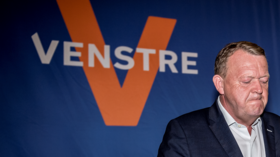Danish PM resigns after left-wing party with strict immigration policy wins general election

Denmark’s prime minister has resigned after his conservative coalition was defeated by the left-wing opposition in a general election. The victorious Social Democrats have promised a tougher migration policy.
Prime Minister Lars Loekke Rasmussen announced his resignation on Thursday, leaving the center-left Social Democrats to try to form a minority government. Led by Mette Frederiksen, the Social Democrats won nearly 26% of the vote, giving them 48 seats in parliament. In total, the “red bloc” coalition consisting of the Social Democrats, the Social Liberals, the Socialist People’s Party and the Red-Green Alliance now control a combined 91 of the 179 seats in the legislature, securing a parliamentary majority.
Rasmussen’s coalition was left badly battered after the populist Danish People’s Party’s vote share nosedived to 8.7%, down from 21.1% in 2015. The defeat was a major blow to Rasmussen's Liberal Party, which has been in power for 14 of the last 18 years.
Also on rt.com Zizek: Only a pan-European left can defeat ‘populism’The victory for the Social Democrats can be attributed at least in part to the decision to adopt a stricter stance on immigration – a policy usually associated with right-wing parties. But for Frederiksen and the Social Democrats, being tough on immigration is a way to help safeguard Denmark’s social welfare system – a platform that has resonated with Danes.
“They have a track record that is very pro-social welfare, and that’s what most Danish voters count on,” Bijan Tavassoli, a member of Germany’s Die Linke, told RT. At the same time, “Voters don’t want to see women with burkas on the streets. They don’t want to see children with veils in schools. They want to see an integrated society, and the Social Democrats have promised to deliver that, while at the same time strengthening the social welfare system.”
Voter concerns over uncontrolled migration was a key issue in last month’s European Parliament elections, in which many right-wing and populist parties across the bloc beat out their more immigration-friendly opponents.
Like this story? Share it with a friend!














